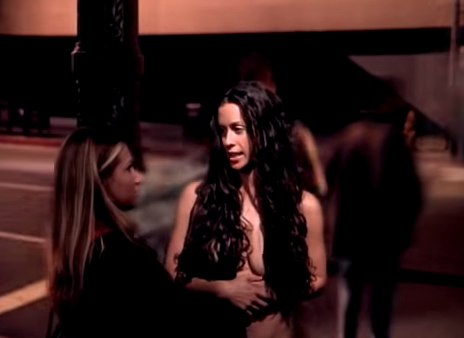While everyone loves to praise Lena Dunham for her “bravery” in choosing to showcase her body so unabashedly on Girls at essentially every opportunity she gets, Alanis Morissette was the true pioneer of displaying so-called ugly nudity during a time when all anyone wanted to see was the thin perfection of Kate Moss.

Her birthday suit appeared in the 1998 video for “Thank U,” the first single from her sophomore album, Supposed Former Infatuation Junkie. Freshly returned from a trip to India, Morissette was feeling all kinds of spiritual, which meant shedding her clothes and other materialist trappings in favor of bareness.
Lumbering through the streets of Los Angeles, Morissette lets anyone and everyone touch her as she pours her heart out through the song. She makes her way through buses (yes, it’s a bit foul to think of the person who might sit there after her), subway stations (L.A. has a subway, you know) and grocery stores all as a way to express her spiritual, I-don’t-give-a-fuck transformation. With Dunham, it’s a completely different story.

When Hannah Horvath isn’t boning someone, she’s still naked, hanging around with no clothes on because, as stated by Dunham herself, “sometimes people are naked.” Very salient. While the “artistic” motive for her nudity has always allegedly been to promote authenticity, it is more about Dunham’s own neuroses. She is proving something to herself and everyone else by displaying what is deemed by American standards of beauty as an ugly body, daring viewers to comment on it but knowing most will not lest they get accused of body shaming, or, worse still, are forced to confront their own puritanical issues.
When Morissette did it, there was a more viable, avant-garde motive behind this type of casual nudity: making people question their inherent self-consciousness via her unapologetic lack of clothing or concern for what her body might look like beneath that clothing. It was practically “Eve-like” in its innocence and absence of awareness. Where Dunham is concerned, a sartorial shortage is often indicative of self-gratification (the joy of knowing she’ll be praised for her “boldness,” or, if not that, still get some kind of attention nonetheless)–the antithesis of Morissette’s message in “Thank U.”




















[…] considered a coming-of-age for rebellious and expressive women in music. From Bikini Kill to Alanis Morissette, the surge in quote unquote angry women on their period had never been so pronounced. And yet with […]
[…] all of the “positive” elements that Dunham has portrayed on the show, like OCD and ugly nudity, what about all of the grossly misrepresenting cliches? Like accidentally snorting crack at a […]
Morrisette is at least curvy and attractive: Dunham is hideous